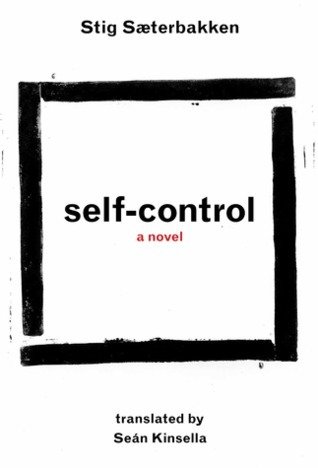Self-Control (A Norwegian Novel)
I was running out of books to read; the recommendations I were receiving from others weren't cutting it and I grew tired of wracking my brain for a title. I ended up acquiring my most recent read through the use of a book generating website called WhichBook. Perhaps it has been recommended before, but you simply choose what suits your fancy, and the website will generate an endless list of books based on your criteria!


(Source: https://www.whichbook.net/)
So I wanted something unpredictable; more than anything else, I love a good book that really throws you for a loop! 😵 From out of the list I was drawn to this one: Self-Control by Stig Sæterbakken.
 (Source: https://www.goodreads.com/book/show/14433733-self-control)
(Source: https://www.goodreads.com/book/show/14433733-self-control)
Our story begins with our narrator, Andreas, meeting up with his daughter, Marit, at a café. We're informed that the pair have not seen each other for many years. Andreas makes some astute observations of his surroundings -- the fire hydrant outside the window, for instance. He also recalls some disturbing news he had heard earlier in the day.
"I started to think about that girl who'd been reported missing earlier in the day, she was 16 and hadn't come home from a party the night before."
The father and daughter begin to talk -- idle chit-chat, about her husband, her job, any thought to kids? But when the conversation turns to Marit's mother, Andreas abruptly informs her that they are getting a divorce. And it is during this very awkward moment that I receive one of the greatest laughs from the book:
"I had to use all of my strength to tame the demon that was wreaking havoc down in my rear end, a loud piercing fart cracked against the seat before I managed to gag it, but she was, fortunately, too beside herself to notice."
However his daughter seems entirely unfazed by the news.
"A few moments passed, then she added, "That was a surprise." She shrugged, in indifference, as if to illustrate how little she cared, and drank what looked like the last dregs from her cup."
As it would turn out the divorce is actual a lie; just a spontaneous lie on Andreas' part. For what reason, he does not give one... The pair finish up their lunch, Andreas gives his daughter some money, and the two part ways as quickly as they had reunited.
Later on Andreas is at work. He doesn't describe a specific line of work, only that he and his co-workers work with some type of machines and are responsible for maintaining them. One of the machines is having an issue, and all Andreas' incompetent boss can offer is to get it fixed.
Something comes over Andreas, something very out-of-character: he decides to go up to his boss' office and knock on his door. His boss calls him in, inviting Andreas to his psychotic world of fly-swatting (the man is obsessed with killing the flies in his office, a jar full of dead carcasses...).
"Was this pathetic figure sitting there, five to ten years my junior, really the person to whom, according to the rules, I was obliged to defer?"
And again without warning, like his lie about the divorce, Andreas suddenly blows up at his boss.
"Get up, you little shit! ... Get up and listen to what I've got to say!"
 (Image created using an AI art generator on Night Cafe)
(Image created using an AI art generator on Night Cafe)
He goes on a very long tirade (trust me -- he lets his boss have it for over 3 pages 😂) before finally taking his leave. But as Andreas is making his way out the door, his boss suddenly confides in him that his wife has cancer; it is terminal, with no cure and no treatment...
"Which is better, do you think? To know the details, to know to the hour how long you have left, or not to know anything, as it would be otherwise, if there was no illness?"
Anyway his boss thanks him for listening and Andreas returns to work.
It is now Saturday evening, and Andreas is having dinner with a close friend, a weekly ritual that he dreads every single time. Although they've been friends since high school, there are many things about his friend Hans-Jacob that Andreas protests; think of an insufferable know-it-all.
"More than anything I wanted to put down my glass, put my arms around him, and squeeze it all out of him so that we could get it over with. Perhaps if I squeezed hard enough, the air would go out of him as if he were a balloon, with a farting sound."
Tired of the drull conversation and feeling like the inferior of the two, Andreas gets up to go to the kitchen and contemplates his current situation -- his life -- where he has a thought that felt like it had been extracted from my own mind...
"And I thought: I am never ever going to experience happiness again. No, it was no thought, it was a certainty, an overwhelming and all-pervasive certainty."
Andreas returns, and Hans-Jacob starts going on about a mnemonic device he's created in order to remember the decimal places of pi (or something). He's quite proud of himself but Andreas doesn't share his enthusiasm; in fact he shuts down Hans-Jacob's idea entirely. It is now Hans-Jacob's turn to leave the room in order to compose himself. When he returns, Andreas has a thought.
"One thought alone cheered me up: what if I jumped on top of him and bit his nose? And soon I was overcome by an irresistible urge to do just that, so much so that I had to hold myself back."
The evening is done, and Hans-Jacob has gone home. Andreas finds himself getting ready for bed, where the missing girl from earlier intrudes his thoughts once again. He and his wife, Helene, lay down for bed, only Andreas can't sleep. He fills his head with horrible thoughts, envisions different ways to die, thinks about his other daughter Nina, considers actually leaving his wife this time... He becomes infuriated at the thought of Helene while watching her sleep.
"Before I knew it I'd lifted my hand up under the duvet, made a fist, and hit Helene as hard as I could on the hip. She let out a scream, turned in the bed like an animal caught off guard."
Helene awakes with a jolt; Andreas pretends to be asleep. She eventually ends up doing the same and nothing more occurs...
The following day, at work, where Andreas is growing more and more apathetic.
"If I received news of someone's death right now, then it wouldn't have made any impression on me, no matter who it might have been. ... If I learned that either Marit or Nina were missing, had vanished without a trace, that there was a suspicion of criminal involvement..."
He is becoming more and more unhinged. Andreas is growing paranoid of his co-workers, visualizes hurting one of them. He thinks about quitting his job, how he would go about doing it. After work, Andreas meets up with his sister and bombards her with his home life, growing up in a house with 3 women (his wife and daughters).
Andreas goes to the bank to take out some money. He stays out that night, without informing his wife Helene about his plans. He goes to a pub, where the waitress thanks him for his generous tip and tries showing him the kitchen. Andreas leaves and goes to the cinema, where he watches a comedy and laughs just a little too loudly, depressed once the film is over... He goes to a café, where he continues to have intrusive thoughts.
"I've actually always been waiting for an accident. I thought, and have almost taken it for granted that sooner or later something terrible would happen that would leave us completely crushed."
Andreas encounters two young women at the café and he spends most of the evening buying the two of them drinks. He remembers his daughter Nina, and reflects on the last time he had seen her, with a stone-cold expression on her face. He has another intrusive thought, of his will, and leaving his two daughters with nothing.
While the women go to the bathroom, Andreas uses the opportunity to ditch the two. He continues walking down the street and notices a newspaper headline.
"VANISHED ran the headline in white letters on a black background. WITHOUT A TRACE. ... It was the last two words that made the biggest impression on me, I thought about it the whole way home."
Andreas finally decides to go back home. He sits at the kitchen table, truly contemplates leaving his wife this time -- just getting up right then and catching the next train. Ultimately he gives up and decides to go lay down with Helene... but not before he catches sight of family photographs.
"Nina... Her picture, in a different frame, wider and more elaborate than the others. I didn't want to look, but forced myself, and in a flash it was as though I could suddenly remember what she looked like. No, not what she looks like, but what she looks like in the photograph. It's the last photograph that was taken of her, early in June, that summer she should have turned 19."

My review...
As alluded to by the title Self-Control, the main theme of the novel is just that: practicing self-control. Although Andreas is a prime example of this, everyone else throughout the book also seems to be on the cusp of a complete breakdown. From his daughter Marit keeping her composure about his divorce lie, to his boss confiding in him about his wife's illness, to his friend trying not to take offense about his mnemonic device, to the women at the café getting drunk... Everyone seems to be one bad move away from exploding.
The author does a great job of reflecting reality in his work. After all aren't most of us living on eggshells? One wrong decision -- one wrong look from the wrong person -- and an entire world could come crumpling down. So many thoughts go unexpressed that it can be difficult to tame the noise; it's a wonder that more of us don't blow up throughout the day! 😄
Andreas' intrusive thoughts were a wonderful reminder to myself, and I'm sure many others. How many of us have wanted to just splurt out something completely spontaneous, with the sole intent to simply create chaos, see people's reactions? How many of us have wanted to give our superiors a piece of our minds, to just cause a scene and quit right then and there? How many of us have wanted to just up and leave in the middle of the night, hop on a train, leave everything behind and start somewhere new? Again it was a refreshing reminder of just how much each of us endures every day yet still manages to keep it under control 😅
As for the ending... I will be honest, it took me a minute. But the idea is that yes, Andreas went the entire book suppressing that his daughter Nina had died. It is never explained, but there obviously has to be some correlation between his daughter's death and the missing girl he recalls throughout the book. Perhaps Nina did die by some heinous means. Perhaps there was criminal involvement.
Regardless it gives you a completely different perspective. Now that we recognize where Andreas' sense of self-control stems from, we cannot help but ponder what else he has had to control himself from doing. I know that, as a parent, it would be very difficult to sit idly by if someone had viciously taken my child away from me...
Just an interesting bit as well...
It was a little... ironic? for lack of better words. While doing a bit of research on the novel, I actually came to discover that the author, Stig Sæterbakken, committed suicide the same year this book was released. I omitted a lot of the story, because half of it is Andreas' inner monologue and his thoughts, but you can tell that it was written very personally. In other words, someone could not have written so raw unless they had experienced it themselves. And it definitely seemed like Sæterbakken was an extremely melancholic, restless man...
